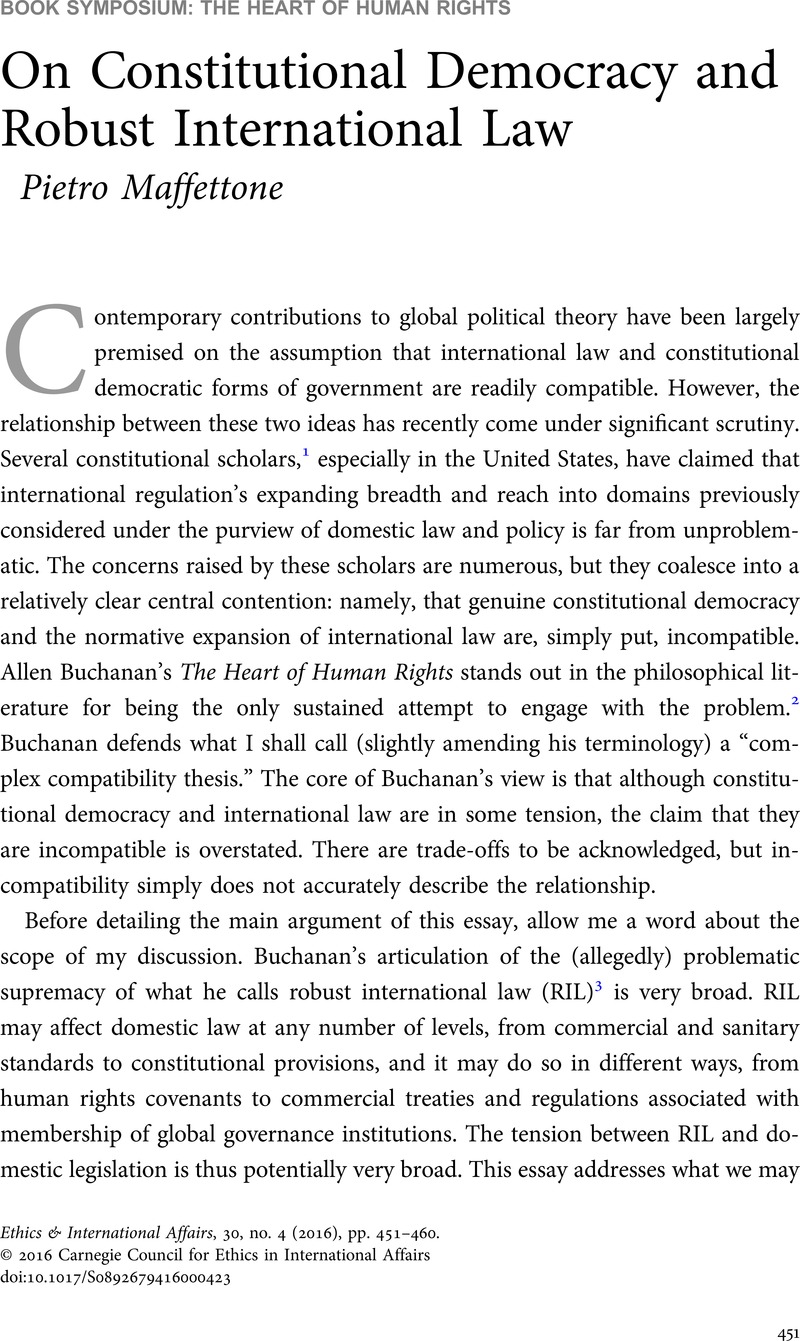No CrossRef data available.
Published online by Cambridge University Press: 08 December 2016

1 See Rabkin, Jeremy A., The Case for Sovereignty: Why the World Should Welcome American Independence (Princeton: Princeton University Press, 2004)Google Scholar.
2 Buchanan, Allen, The Heart of Human Rights (New York: Oxford University Press, 2013), ch. 6CrossRefGoogle Scholar.
3 Buchanan defines robust international law as “international law that claims the authority to regulate matters once considered to be the exclusive concern of the state, including the state's treatment of its own citizens within its own territory.” Ibid., p. 224.
4 Ibid., pp. 225, 230.
5 See especially, Rabkin, The Case for Sovereignty.
6 Buchanan, The Heart of Human Rights, p. 231.
7 Ibid., pp. 234–35.
8 The question of what constitutions are for is intimately connected to what they actually are. This would include reference to their standing as superior law, their justiciability, their level of entrenchment (i.e., the special procedures required to amend them), their ability to provide a modicum of continuity through time, etc. For a discussion of what constitutions are, see Raz, Joseph, Between Authority and Interpretation: On the Theory of Law and Practical Reason (New York: Oxford University Press, 2009), ch. 13CrossRefGoogle Scholar.
9 See Jackson, Vicki C. and Tushnet, Mark, Comparative Constitutional Law: Cases and Materials (Saint Paul, Minn.: Foundation Press, 1999)Google Scholar.
10 Hegel, Georg Wilhelm Friedrich, Elements of the Philosophy of Right, ed. Wood, Allen W., trans. Nisbet, H. B. (Cambridge: Cambridge University Press, 1991), p. 313 Google Scholar.
11 The preamble to the Irish constitution provides a clear example of this functional claim. Bunreacht na hÉireann (Constitution of Ireland), July 1, 1937, www.taoiseach.gov.ie/eng/Historical_Information/The_Constitution/February_2015_-_Constitution_of_Ireland_.pdf.
12 An expanded version of the argument I present in this essay would have to pay particular attention to the differences between written and unwritten constitutions in terms of their legitimating function. I will not pursue this issue any further here, but will simply assert that I do not think that the difference between written and unwritten constitutions is detrimental to the substance of the overall argument.
13 Michelman, Frank I., “Legitimacy, the Social Turn, and Constitutional Review: What Political Liberalism Suggests,” Critical Quarterly for Legislation and Law 3 (2015), pp. 3–4 Google Scholar.
14 Sources here include the work of authors such as John Rawls, Charles Larmore, and Bruce Ackerman, although I draw not on a specific author's interpretation of political liberalism, but rather on what I understand to be the common core of political liberalism as a whole.
15 Eberle, Christopher J., Religious Conviction in Liberal Politics (Cambridge: Cambridge University Press, 2002)CrossRefGoogle Scholar.
16 Weithman, Paul, Why Political Liberalism? On John Rawls's Political Turn (New York: Oxford University Press, 2010)Google Scholar.
17 Laborde, Cécile, “From Constitutional to Civic Patriotism,” British Journal of Political Science 32, no. 4 (2002), p. 598 CrossRefGoogle Scholar.
18 See Habermas, Jürgen, “Struggles for Recognition in the Democratic Constitutional State,” in Multiculturalism, ed. Gutmann, Amy (Princeton: Princeton University Press, 1994)Google Scholar, and Müller, Jan-Werner, Constitutional Patriotism (Princeton: Princeton University Press, 2007)Google Scholar, for an original reconstruction.
19 See Ackerman, Bruce, “A Generation of Betrayal?” Fordham Law Review 65 (1997)Google Scholar.
20 That, of course, is unlikely to be the case: first, because reasonable pluralism would apply to at least a subset of those issues; and second, because no such list could plausibly be literally exhaustive.
21 See Jouanjan, Oliver, “Freedom of Expression in the Federal Republic of Germany,” Indiana Law Journal 84, no. 3 (2009)Google Scholar.
22 As of 1985, section 130 of the German Penal Code outlaws different forms of “incitement to hatred” and gives special attention to Holocaust denial (see especially, sections 130.3 and 130.4).
23 The paradigmatic case here concerns the discussion of prisoners’ voting rights. See Hirst v. the United Kingdom (no. 2), 74025/01 (2005).